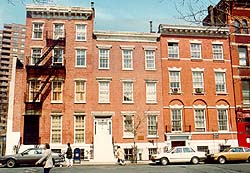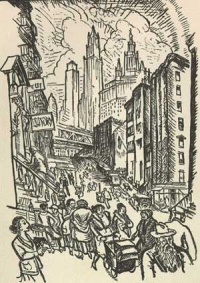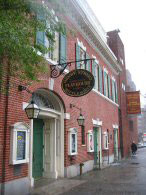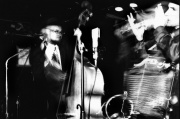Henry Street Settlement
From East Broadway, Chinatown
Contents |
History
Henry Street Settlement is a historical organization that provides the Lower East Side community with various services to help those in need achieve better living conditions for themselves. The non-sectarian settlement house was founded in 1893 by a young nurse, Lillian Wald, after her first experience with tenement conditions on a home visit to an elderly Lower East Side resident. Having been raised in a well-to-do German Jewish family, the young Lillian Wald was shocked and appalled by the filthy, cramped living environment bred by tenements, and took it upon herself to make a difference. Beginning as a nursing service, this organization expanded to provide the community with social, recreational, and educational services, which truly impacted the lives of the impoverished immigrants residing on the Lower East Side at the time. As a part of the progressive settlement house movement, the Henry Street Settlement fought to provide services that were almost non-existent before it's founding. Immigrants who lacked any knowledge of American life, and had few resources to establish themselves in a new world could turn to the settlement house not only in times of emergency and need, but also as a genuine gathering place within the LES community.The Community
The Lower East Side community has a rich cultural history and today is still one of the most ethnically diverse communities in the country, being comprised of Latinos, Asians (from China, Cambodia, Vietnam, Thailand, Bangladesh and India), African Americans, Eastern Europeans and Orthodox Jews. This neighborhood has dealt with some very serious problems, including above average instances of poverty, teenage pregnancy, school drop-outs, youth arrests, and unemployment. Indeed, 37% of the residents of the LES live below the poverty line (17% higher than the national average).
Henry Street knows the community it serves well and addresses the problems it faces head on through the use of specialized branches including shelter and supportive services; behavioral and health services; senior services; homecare services; day care centers; workforce development center; and a multidisciplinary arts center. Since its founding, the Henry Street Settlement has made a point of evolving its services to keep up with a changing community. Addressing the rapidly growing Chinese and Hispanic immigrant populations, the settlement employs many professionals fluent in Chinese and Spanish.
Lillian Wald herself sketched these drawings of Henry Street along East Broadway in 1934. Though it is obvious that times have changed, the Henry Street Settlement's efforts to understand the Lower East Side community have not.
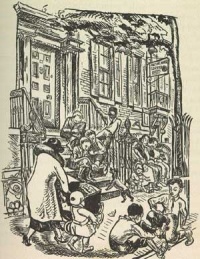
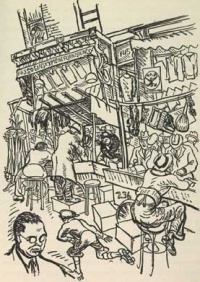
Abrons Arts Center
The Abrons Arts Center is one of the specialized branches of the Henry Street Settlement that offers educational and arts enrichment programs.The four theaters of the arts center serve as a venue to display the artist abilities of those from local schools and those in amateur arts groups. The center provides classes in dance, drama, visual art, and music to children and adults of the community.The Abrons Arts Center was the first of its kind to specialize in providing such services and classes to a largely low-income target audience. While it is now a well accepted fact that art and after-school activities can benefit the lives of at-risk youth, Lillian Wald and the Henry Street Settlement were among the first to recognize that the arts had a place in social justice. BLANK, the receptionist (and a former student) at the Abrons Arts Center, stressed that the goal of the center is to nurture art, particularly in youth, because Lower East Side children are often deprived of opportunities to express themselves creatively. So in order to make up for this deprivation, the Abrons Arts Center brings in distinguished artists as artists-in-residence. Famous names such as Eugene O'Neill, Robert Browning, Isadora Duncan, Martha Graham, Fred Astaire, George Gershwin, Igor Stravinsky, Dizzy Gillespie, and Eartha Kitt have all taught, trained, or performed at the Center.
Through the Arts-in-Education outreach program, the Arts Center also works with public schools in the Lower East Side community. Organizing art classes with a Teaching Artist, the Arts Center often works with P.S. 134 on East Broadway, even displaying student work in their gallery. For example, the main display in the lobby of the Abrons Arts Center currently features a photo gallery with a caption "The work in the gallery highlights the collaboration between Henry Street Settlement Youth Services Program and Abrons Arts Center's Digital photography class." Photography displayed was produced by 7th and 8th graders under the guidance of Teaching Artist Steven Thompson.
Carnegie Hall
As exemplified by the relationship that Henry Street Settlement and more specifically Abrons Arts Center has developed with sponsors, many companies see the importance of the role of the arts in New York City communities. For example, a concert series featuring the Wiyos, a jazz band, is sponsored by Carnegie Hall. Bigger organizations with more funding help out the Abrons Arts Center by providing support and fresh talent. As Leah Swann, a representative for Carnegie Hall's Neighborhood Concert Series relates "We try to get to know a community and then serve its artistic needs." A packed recital hall of one of these performances only proves that the community is equally excited to have these arts services available to them, and the diverse nature of the audience reflects the participation of many cultures within the Lower East Side.Behavioral & Health Services
Another branch of the Henry Street Settlement, the Community Consultation Center (CCC) is a mental health facility that aims to meet another aspect of need from the Lower East Side community. Some of the services provided by CCC include: outpatient services, psychiatric treatment, primary healthcare, HIV/AIDS counseling, and Asian bi-cultural services. The staff provides services in English, Spanish, Italian, German, Portugese, and three dialects of Chinese (Cantonese, Mandarin, and Taiwanese) to meet the needs of the multi-ethnic community. Although the services are primarily provided to the Lower Manhattan community, anyone who wishes to may apply for the services as well.
Asian Bi-Cultural Services
Of particular interest to our class and its research on the Fuzhounese immigrant community and the Henry Street Settlement's effort to serve this growing population, is its health service, the Community Consultation Center. The CCC developed the subdivision of Asian Bi-Cultural Services in 1997 to help meet the mental health needs of the ever expanding Asian community that emerged on the Lower East Side. Mental illness is viewed with a certain stigma in Asian households. The services provided by the subdivision help relieve the family conflicts that often arise in Immigrant households that results from the clashing of older and younger generations who find themselves in a new culture. The East-West bi-cultural staff for this subdivision help those who partake in the outpatient and psychiatric treatment services get a sense of how to resolve the seemingly disconnected value systems of the different generations.
Employment Services
Following in its tradition of helping the residents of the Lower East Side, the Henry Street Settlement has a Workforce Development subdivision that provides training and job placement for those looking for employment. Henry Street has been helping those in the community secure employment for over 30 years, and these efforts were recently concentrated in 2003 under the umbrella establishment of the Workforce Development Center (WDC).
Workforce Development Center
The WDC offers services to the community including job training and placement for adults and youth as well. The youth that generally benefit from these services are out of school, with some being drop-outs. With a goal of improving the skills of those that seek WDC's services, this sector of Henry Street focuses on getting clients in classes to hone existing skills. WDC keeps in mind the largely Immigrant population of the Lower East Side that may have limited English speaking skills by offering services that improve the language and communication abilities of those who speak English as a second language. These ESL courses help clients build confidence in use of the English language, not just in the workplace, but as a lifelong skill as well. WDC actively helps the community by offering a bevy of jobs that are based at Henry Street, with positions that range from Data Entry Clerk to Urban Family Center Case Manager. Additionally, relationships are established with third party employers to help them fill voids in the workforce with properly trained candidate from WDC.
